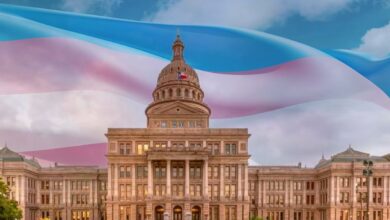
SCOTUS Overturns Roe v. Wade
Justice Thomas’ concurring opinion urges the court to also reconsider pro-LGBTQ decisions.

In a ruling that is expected to have significant repercussions for LGBTQ people, the U.S. Supreme Court ruled 6-to-3 on June 24 that the U.S. Constitution “does not prohibit” states from banning abortion.
Underscoring that concern, Justice Clarence Thomas wrote a concurring opinion that urges the court to “reconsider all of this Court’s substantive due-process precedents, including Griswold, Lawrence, and Obergefell.” Lawrence struck down state bans on same-sex sexual relations, Obergefell removed state bans on same-sex marriage, and Griswold removed bans on contraceptives.
However, Justice Samuel Alito downplayed the concern for how the decision will impact other rights, including the right of same-sex couples to marry, the right to have same-sex relations, and the right to obtain contraception.”
“These attempts to justify abortion through appeals to a broader right to autonomy and to define one’s ‘concept of existence’ prove too much,” wrote Alito, who was joined on the majority opinion by Justices Clarence Thomas, Neil Gorsuch, Brett Kavanaugh, and Amy Coney Barrett. Chief Justice John Roberts did not sign on to Alito’s decision but issued his own opinion, concurring in the judgment.
Alito offers thin reassurance that the decision will not impact these other rights.
He said the majority has “stated unequivocally that ‘[n]othing in this opinion should be understood to cast doubt on precedents that do not concern abortion,’” adding that abortion involves taking a “potential life,” while the decisions in the other cases do not. Then he adds this:
“Each precedent is subject to its own stare decisis analysis, and the factors that our doctrine instructs us to consider, like reliance and workability, are different for these cases than for our abortion jurisprudence,” said Alito. Given that the Dobbs decision analysis of stare decisis (respect for precedent) overturns the 50-year-old Roe v. Wade decision, this reassurance falls empty. Obergefell v. Hodges, striking state bans on same-sex marriage, was issued only seven years ago. Lawrence v. Texas, striking state bans on consensual sex between same-sex adults, was issued only 19 years ago.
Adding to that concern, Justice Clarence Thomas, in a concurring opinion, urges the court to “reconsider all of this Court’s substantive due process precedents, including Griswold, Lawrence, and Obergefell. He said the court has “a duty to ‘correct the error’ established in those precedents….”
The 6-to-3 decision came in Dobbs v. Jackson, a case in which an abortion clinic challenged a new law in Mississippi that banned abortion at any time after 15 weeks unless there is a medical emergency or severe fetal abnormality.
In an unprecedented development, a draft of a majority opinion was leaked to the press on May 2, seeming to indicate that the court was poised to overturn its longstanding decisions protecting the right to abortion. LGBTQ legal activists were alarmed at the language of that draft, written by Justice Samuel Alito, saying it laid the groundwork to overturn landmark decisions in support of rights for LGBTQ people.
Roe v. Wade, in 1973, said the Constitution implies that citizens have a right to privacy and liberty, and that those rights cover the right to choose an abortion. Planned Parenthood v. Casey, in 1992, said states could regulate abortion once a fetus becomes viable as long as the regulations did not create an undue burden on women who seek an abortion.
During oral argument on December 1, the Supreme Court justices discussed the implications for the Dobbs decision on two major LGBTQ decisions: Lawrence v. Texas and Obergefell v. Hodges. Lawrence ruled that states could not ban sexual relations between same-sex couples, while Obergefell ruled that states could not prohibit same-sex couples from marrying.
Generally, judges and justices are expected to keep preconceived ideas of how a case might be decided to themselves. But Justice Brett Kavanaugh appears to have abandoned that protocol, too. In his concurring opinion, he includes a footnote (page 8) that says Obergefell “overruled” Baker v. Nelson.
“Much of American society was built around the traditional view of marriage that was upheld in Baker v. Nelson, and that was reflected in laws ranging from tax laws to estate laws to family laws. In Obergefell v. Hodges, the Court nonetheless overruled Baker.
The court did not “overrule” Baker v. Nelson. That was a 1972 appeal case in which the Supreme Court did not issue an opinion. Instead, it summarily dismissed a gay couple’s appeal to recognize same-sex marriage.
“This is the most shockingly activist Court we have seen in any of our lifetimes,” said Jenny Pizer, senior legal counsel for Lambda Legal. “The arrogantly selective reading of history and disdain for generations of jurisprudence would be bizarre if it weren’t so terrifying.”
In the Dobbs majority abortion opinion on June 24, the court does overturn two major precedents: Roe v. Wade and Planned Parenthood v. Casey. Roe v. Wade, in 1973, said the Constitution implies that citizens have a right to privacy and liberty, and that those rights cover the right to choose an abortion. Planned Parenthood v. Casey, in 1992, said states could regulate abortion once a fetus becomes viable as long as the regulations did not create an undue burden to women who seek an abortion.
In his opinion concurring in the judgment of the majority, Chief Justice John Roberts says he sees “no sound basis for questioning the adequacy” of 15 weeks for a woman to obtain an abortion. He chose not to sign onto Alito’s opinion, apparently because, as Alito said, “its dramatic and consequential ruling is unnecessary to decide the case before us.”
“The Court’s decision to overrule Roe and Casey is a serious jolt to the legal system—regardless of how you view those cases,” Roberts wrote. “A narrower decision rejecting the misguided viability line would be markedly less unsettling, and nothing more is needed to decide this case.”
“Seeing this carte blanche invitation to [state] legislatures to eliminate the freedom to make one’s own decisions about one’s own body and life, especially following yesterday’s absurd decision elevating gun rights over public safety,” said Lambda’s Pizer, “offers a picture of American society potentially transformed in a horrifying direction.”
© 2022 Keen News Service











Comments